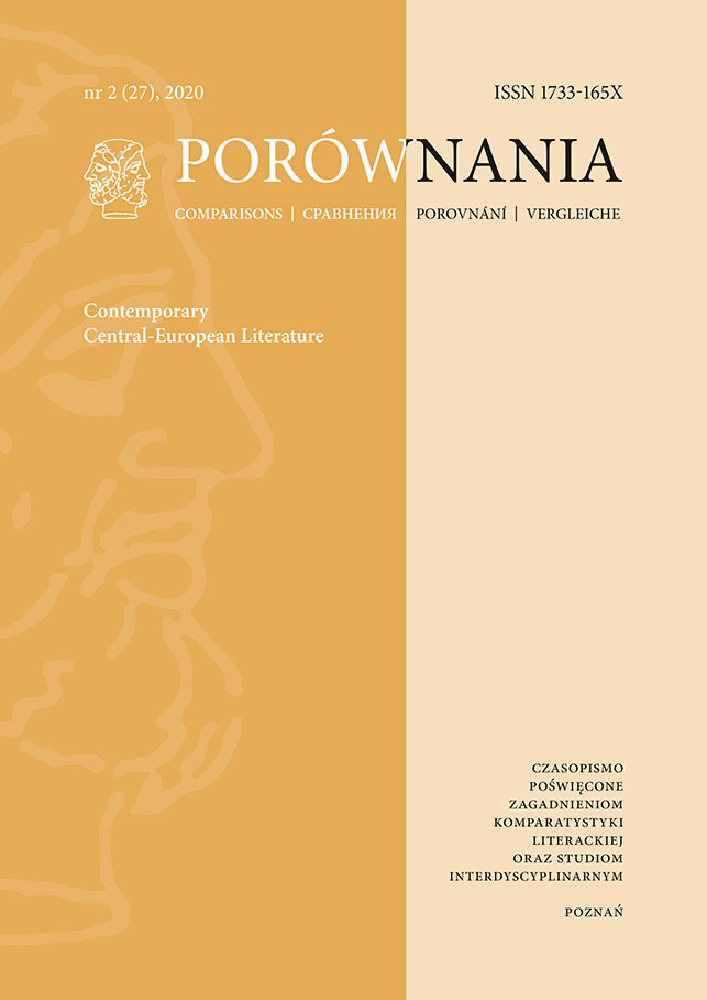Abstrakt
In the Czech literary scene, it is Jáchym Topol who may justly be labelled the author most consumed with Central Europe, one who is constantly attempting to decrypt the message encoded in its scars and wrinkles. His fictional treatment of Central-European themes is preceded by thorough knowledge of both the history and present state of the region. However, Topol is not merely a historian; in his fictionalising he uses a poetic, complex perspective, and arrives thus at a unique expression. Particular recurring figures in his literary work seem to answer in a riddle the questions of present-day Central Europe. First one of those is the biblical image of the field or of the pile of bones. In Topol’s writing, it represents both the systematic violence in Central-European history, and universal onus. The second recurring figure is the figure of a good-hearted headsman. In Topol’s prosaic and dramatic texts, the headsman embodies the ambivalence of the Czech national character, but also its survival strategies. It is intertextually linked to the works of Jaroslav Hašek, and brings the notion “Czechs are a Švejk-like nation” to its absurd, augmented consequences. The third figure which keeps returning in Topol’s work combines the features of a character and of a symbol. It is the figure of Madonna, representing the spiritual dimension of Central European tradition, bound to Christianity. The various Madonnas—the Polish Madonna of Częstochowa, the War Madonna in fictionalised modern-day Russia and eventually the Czech Madonna of Poříčí create the Christian counterworld in Topol’s novels, and signalize the persistent role and presence of spirituality in the region. In Topol’s novel Citlivý člověk it is actually thanks to this Madonna that the whole discourse opens to a new type of perspective.
Reference
Assmann, Jan. “Ägypten als Gegenwelt.” Gegenwelten zu den Kulturen Griechenlands und Roms in der Antike. Ed. Tonio Hölscher. München: Degruyter, 2000. 67–83.
Chew, Geofrey. “‘Dissidence’ in Holocaust Memorials in Literature: Jáchym Topol’s Devil’s Workshop (Chladnou zemí).” Central Europe 15 (2015), https://tinyurl.com/yagpahyh. Accessed 12 April 2015.
Dolejší, Karel. “Milan Kundera a tragédie střední Evropy.” Britské listy, 15 October 2006, https://legacy.blisty.cz/art/43224.html. Accessed 12 December 2019.
Doležel, Lubomír. Heterocosmica II: Fikční světy postmoderní české prózy. Praha: Univerzita Karlova v Praze, 2014.
Engelking, Leszek. “V mládí jsem občas chtěl být Polák… .Polsko, polština a Poláci v románu Sestra Jáchyma Topola.” Otevřený rány: vybrané studie o díle Jáchyma Topola. Ed. Ivo Říha. Praha: Torst, 2013. 77–88.
Hašek, Jaroslav. Velitelem města Bugulmy. Praha: Československý spisovatel, 1966.
Hašek, Jaroslav. “Commanding Officer, Town of Bugulma.” Behind the Lines. Bugulma and other stories. Trans. Mark Corner. Praha: Karolinum, 2012. 7–21.
Holý, Jiří, et al. Holocaust—Šoa—Zagłada v české, slovenské a polské literatuře. Praha: Karolinum, 2007.
Holý, Jiří, ed. Šoa v české literatuře a kulturní paměti. Praha: Akropolis 2011.
Jűrgensová, Zuzana and Marszałková, Magdalena. “Svědci a dědicové dějin: holokaust v české literatuře.” Otevřený rány. Vybrané studie o díle Jáchyma Topola. Ed. Ivo Říha, Praha: Torst, 2013. 263–275.
Kaptayn, Valentina. “Another Way to Remember. Jáchym Topol’s Works Sestra (1994) and Chladnou zemí (2009) in the Context of Czech Cultural Memory of the Holocaust.” The Holocaust in Central European Literatures and Cultures since 1989. Ed. Reinhard Ibler. Sttugart: Ibidem-Verlag, 2014. 263–274.
Topol, Jáchym. Sestra. Brno: Atlantis, 1994.
Topol, Jáchym. Anděl. Praha: Hynek, 1995.
Topol, Jáchym. City Sister Silver. Trans. Alex Zucker. North Haven: Catbird Press, 2000.
Topol, Jáchym. “Uvařeno.” A2 2 (2005): 1, 25–26, https://tinyurl.com/y784hq8q. Accessed 12 April 2015.
Topol, Jáchym. Kloktat dehet. Praha: Torst, 2005.
Topol, Jáchym. Supermarket sovětských hrdinů. Praha: Torst, 2007.
Topol, Jáchym. Gargling With Tar. Trans. David Short. London: Portobello, 2010.
Topol, Jáchym. The Devil’s Workshop. Trans. Alex Zucker. London: Portobello, 2013.
Topol, Jáchym. Angel Station. Trans. Alex Zucker. Victoria, TX: Dalkey Archive Press, 2017a.
Topol, Jáchym. Citlivý člověk. Praha: Torst, 2017b.
Trávníček, Jiří, ed. V kleštích dějin. Střední Evropa jako pojem a problém. Brno: Host, 2009.
Zucker, Alex. “The Jáchym Topol Interview.” The Quarterly Conversation 33 (2013). 2 September 2013, https://tinyurl.com/kwtcutw. Accessed 12 April 2020.
Licence
Utwory opublikowane w czasopiśmie „Porównania”, na platformie Pressto należącej do Uniwersytetu im. Adama Mickiewicza w Poznaniu są udostępniane na licencji Creative Commons Uznanie autorstwa - Bez utworów zależnych 4.0 Międzynarodowe (CC BY-ND 4.0)
Tym samym wszyscy zainteresowani są uprawnieni do korzystania z utworów opublikowanych pod następującymi warunkami:
-
uznania autorstwa — czyli obowiązek podania wraz z rozpowszechnianym utworem informacji o autorstwie, tytule, źródle (odnośniki do oryginalnego utworu, doi) oraz samej licencji
-
bez utworów zależnych — remiksując, przetwarzając lub tworząc na podstawie utworu, nie wolno rozpowszechniać zmodyfikowanych treści.
-
brak dodatkowych ograniczeń — nie można korzystać ze środków prawnych lub technologicznych, które ograniczają innych w korzystaniu z utworu na warunkach określonych w licencji.
Uniwersytet im. Adama Mickiewicza w Poznaniu zachowuje prawo do czasopisma jako całości (układ, forma graficzna, tytuł, projekt okładki, logo itp.).
Autor zachowuje prawa majątkowe, ale udziela zgody Uniwersytetowi im. Adama Mickiewicza w Poznaniu na wykorzystanie dzieła. Autorzy tekstów zakwalifikowanych do publikacji proszeni są o wypełnienie podpisanie i przesłanie umowa (PL) agreement (EN)
Agreement for granting a royalty-free license to works with a commitment to grant a CC sub-license




